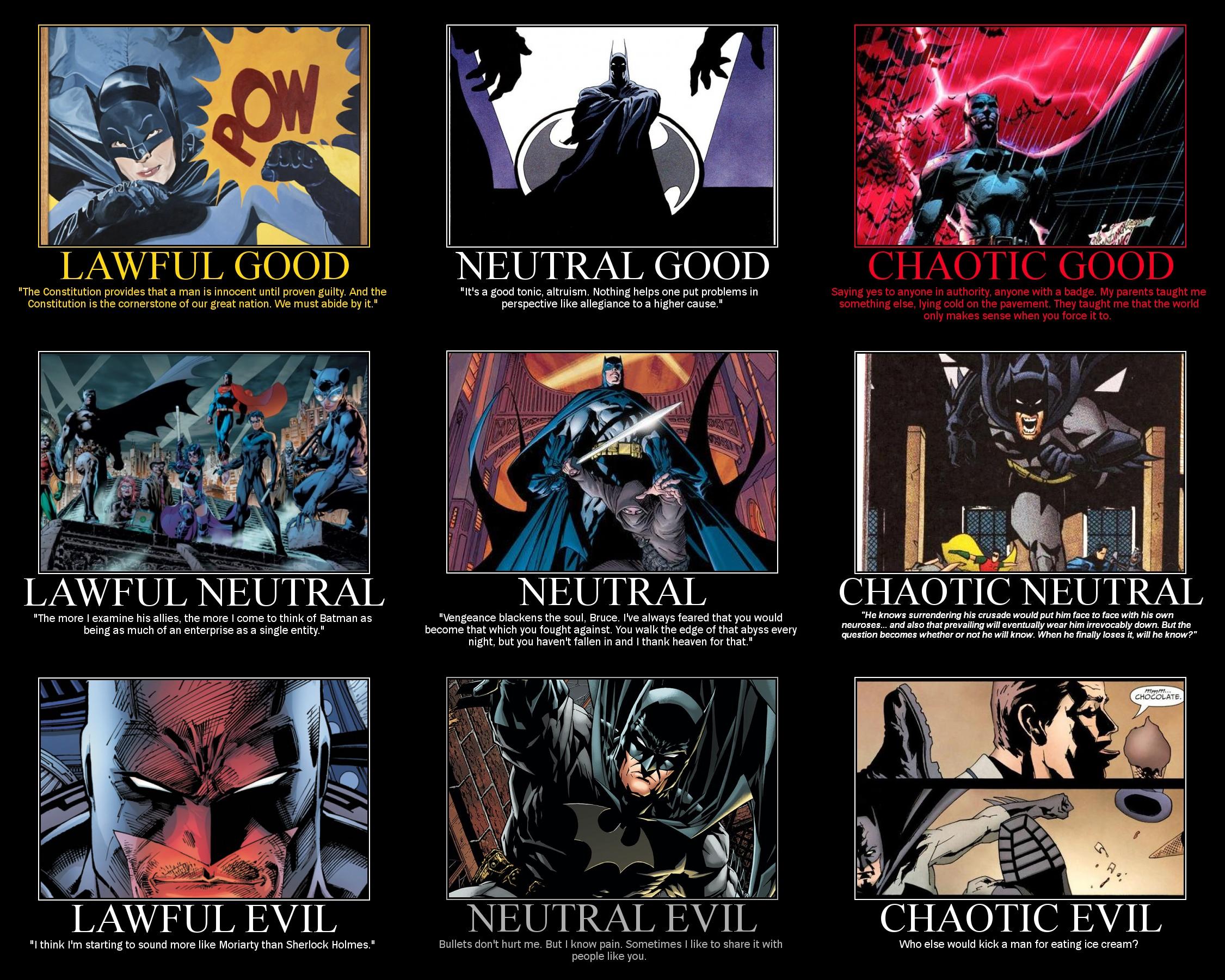This is an old nerdy question, but it's one of my favourites; what D&D alignment is Batman?
It's one of those things which can be argued almost any way. Pick a favourite Batman, or a synthesis that is the perfect Batman. I'm just curious about how the Caped Crusader (or, if you prefer, the Dark Knight) is understood by Escapists.
Just remember, you're probably wrong:

P.S. The Escapist wrote some good articles about alignment back in the day, you should read them.
http://www.escapistmagazine.com/articles/view/columns/checkfortraps/8386-All-About-Alignment
http://www.escapistmagazine.com/articles/view/columns/checkfortraps/8436-All-About-Alignment-Part-II
Alignment is basically the moral stance of a character, divided along two axes: Lawful/Neutral/Chaotic and Good/Neutral/Evil, creating 9 possible combinations. There's a lot of debate about what exactly each alignment is (even official definitions vary between editions), but in general:
Lawful: The belief that everything should follow an order, and that people should create, uphold and follow natural and mortal law. One judges the quality of an action by the 'goodness' of the action itself, or the ends DON'T justify the means. (AKA Deontology) EDIT As BabySinclair points out, 'Lawful' doesn't necessarily mean 'follows the law'; if a person has a hard-and-fast moral code they stick to no matter what, that's Lawful, even if the code doesn't match society's legal code (otherwise you could never have a Lawful Evil character).
Chaotic: The belief in personal flexibility and freedom, even (and perhaps especially) when that conflicts with society. One judges the quality of an action by the consequences of the action, so sometimes the ends DO justify the means (AKA Consequentialism)
Good: A willingness to act altruistically, to sacrifice the self for others (typically a large group, like a inhabitants of a country).
Evil: A willingness to act in your your own self-interest (or the interests of a small group, like your close friends and family) while disregarding others. One may still help others as a result of their actions, but it's not their primary motivation.
Neutral: The character has no strong inclinations towards one side of the axis or the other. Usually seen in Lawful/Chaotic, when they have no overwhelming desire either to follow or break the law, but it exists in Good/Evil too. This doesn't mean that the character has no morals; for example, a Lawful Neutral character usually has a personal code that they follow, regardless of whether or not that leads to good or evil outcomes.
Wikipedia has a pretty good page on alignment; scroll down to where it breaks down each category individually and gives examples if you're still unsure.
Lawful: The belief that everything should follow an order, and that people should create, uphold and follow natural and mortal law. One judges the quality of an action by the 'goodness' of the action itself, or the ends DON'T justify the means. (AKA Deontology) EDIT As BabySinclair points out, 'Lawful' doesn't necessarily mean 'follows the law'; if a person has a hard-and-fast moral code they stick to no matter what, that's Lawful, even if the code doesn't match society's legal code (otherwise you could never have a Lawful Evil character).
Chaotic: The belief in personal flexibility and freedom, even (and perhaps especially) when that conflicts with society. One judges the quality of an action by the consequences of the action, so sometimes the ends DO justify the means (AKA Consequentialism)
Good: A willingness to act altruistically, to sacrifice the self for others (typically a large group, like a inhabitants of a country).
Evil: A willingness to act in your your own self-interest (or the interests of a small group, like your close friends and family) while disregarding others. One may still help others as a result of their actions, but it's not their primary motivation.
Neutral: The character has no strong inclinations towards one side of the axis or the other. Usually seen in Lawful/Chaotic, when they have no overwhelming desire either to follow or break the law, but it exists in Good/Evil too. This doesn't mean that the character has no morals; for example, a Lawful Neutral character usually has a personal code that they follow, regardless of whether or not that leads to good or evil outcomes.
Wikipedia has a pretty good page on alignment; scroll down to where it breaks down each category individually and gives examples if you're still unsure.
It's one of those things which can be argued almost any way. Pick a favourite Batman, or a synthesis that is the perfect Batman. I'm just curious about how the Caped Crusader (or, if you prefer, the Dark Knight) is understood by Escapists.
Just remember, you're probably wrong:

P.S. The Escapist wrote some good articles about alignment back in the day, you should read them.
http://www.escapistmagazine.com/articles/view/columns/checkfortraps/8386-All-About-Alignment
http://www.escapistmagazine.com/articles/view/columns/checkfortraps/8436-All-About-Alignment-Part-II
